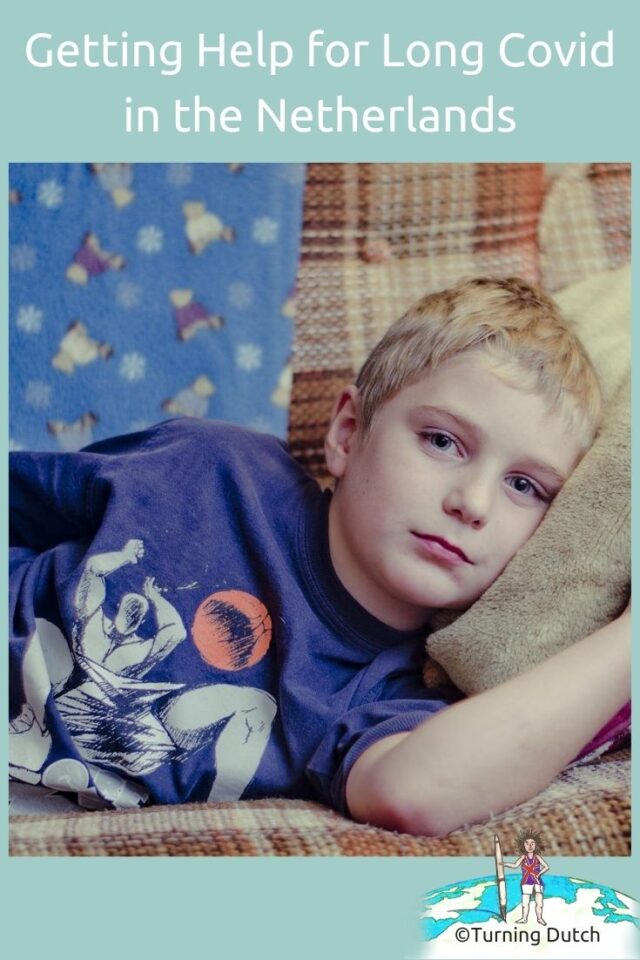More than two years after our first COVID-19 infection three of our family are suffering from Long COVID. Here’s my family’s story of Long COVID (also known as post COVID syndrome), the impact it is having on our lives and where you can turn for help for Long COVID in the Netherlands.
March 2020
I was feeling under the weather. Neighbours had invited us to a housewarming party, but I stayed home whilst the rest of the family went.
It was the weekend before the Dutch prime minister announced measures to combat the spread of the COVID-19 virus. Carnival time and ski holidays had played a role in spreading the virus around the Netherlands. The government told us to cough and sneeze into our elbows and stop shaking hands. Wash our hands. No more big group gatherings. Work from home. Symptoms? Stay at home.
Back then the predominate symptoms we were told to look out for were a cough and fever. I had neither. I felt flu-y and I spent two weeks moving between the sofa and bed. As far as we were concerned I had the flu.
As days turned into weeks doubts started creeping in. The Netherlands went into lockdown, schools closed and then went online.
From One Family Member to Another
Then my husband became ill and spent a couple of days in bed. Then one by one all three of our children fell ill. Headaches, fatigue, shortness of breath. That took us through to the end of April.
Shortness of Breath
We took one of our children to the huisarts (GP) because his breathing was becoming more and more difficult. Our GP referred him to our local COVID centre to check over. There was no COVID testing back then, unless you were admitted to hospital. Thankfully that wasn’t necessary for our son, unlike the patient in front of him in the queue.
The doctor stated that he was as sure as he could be without a test that my son had COVID-19. The doctor prescribed an inhaler as a temporary tool to help with his breathing. Little did we know then that he would use it for a year.
Another of our sons has the same issue, but to a lesser extent.
Fitness Plummeted
Dutch schools reopened their physical doors in May 2020, but my two youngest were still home. Still not recovered from COVID-19, more than a month after the virus hit them. Football clubs recommenced training and my sons struggled with their fitness for the rest of the season.
Throughout the summer of 2020, any exertion left my sons short of breath. Before COVID-19, a 9 and an 11 year old playing football three times a week with daily sessions on the trampoline with no issues at all. Suddenly, they struggled with such physical exertion.
Prone to Viruses
School restarted after the summer break and we had three children that seemed to catch every and any virus going. By December my two youngest had been back and forth to the GP with recurring symptoms: sore throats, headaches, stomachaches and fatigue.
Blood tests were run. Glandular fever was found in December 2020.
Paediatrician Referral May 2021
And the symptoms continued. New blood tests showed that the glandular fever virus was no longer active. There was no explanation in their blood for the continued and prolonged symptoms.
Our youngest was still in the worst shape and our GP referred him to the paediatrician in May 2021. And so began months of poking, prodding and testing.
In the summer of 2021, he had an acute appendicitis. I took him to the GP in the morning and within hours he was on an operating table. Cause unknown.
The hospital did echos in the months after the operation, as my son increasingly complained of stomachaches. But also a sore throat, cold like symptoms, headaches and fatigue.
Post Viral Syndrome – Suspected Long COVID
Complete and utter fatigue. Fatigue that is definitely not normal for a ten year old. We reached the stage that if my son did a full week or two of school, he would spend a week ill on the sofa or in his bed. The pattern continued for months until February 2022.
In February 2022, we put Long COVID on the table again. As there was no testing done back in March 2020, there was no way of proving 100% that COVID-19 was the culprit. In May 2021, the paediatrician had actually stated that it was unlikely to be Long COVID. Quite frankly, the doctors didn’t know enough at the time to definitively make that call.
And there was of course the myth that the RIVM had reiterated that children didn’t get ill with COVID-19 and so there was nothing to worry about.
By February 2022, attitudes had definitely changed about children and Long COVID in the Netherlands.
The paediatrician at our local hospital had begun to see more and more children with the same symptoms. All fitting into the spectrum of Long COVID. She diagnosed my son with post-viral syndrome and referred him to a revalidation physiotherapist, told us to reduce his school hours with immediate effect and gradually rebuild his physical condition. She also referred him to a medical psychologist to deal with the mental impact that Long COVID is having on him.
Mental Impact of Long COVID
Three months on and we are still waiting to see the medical psychologist at the hospital. Long story short, there’s now a backlog of children with Long COVID and so there’s a waiting list to get help.
The physical side of Long COVID is awful. But the mental strain is a close second. I have a ten year old boy who hasn’t been able to do the things that boys of ten usually do. And he hasn’t been able to do these normal things fully since he was eight.
Playing with friends after school.
Going to school full time.
Playing with his football team.
Days or trips out.
All simple things.
And There’s More
Whilst our ten year old was going through this, we were aware that our recently turned twelve year old wasn’t doing great either. His decline was more gradual and didn’t really hit hard until September 2021, when secondary school began to clearly take it out of him.
His story is similar to his brothers. April 2020, he caught COVID-19. He spent the summer breathless and tired. The GP ordered blood tests, and glandular fever was found. On and off, he had varying symptoms. But September 2021 signalled the start of a serious decline in his physical health. He was sick every couple of weeks with one virus or another, so it seemed.
In March 2022, after getting COVID-10 for a second time, he was diagnosed with Tietze syndrome.
The GP eventually referred us to the kinderarts, who diagnosed Long COVID during the first appointment. The doctors had seen it so many times by then, she could spot it a mile off.
Again, the kinderarts told my son he needed to reduce his hours in school, build up slowly. Easier said than done in the brugklas, but thankfully my son’s mentor has been fabulous, with a capital F and is thinking with us, guiding my son though it.
Oh, And a Bit More
My GP diagnosed me with Long COVID in August 2020. And I am still not back to full health. I am supporting my children through their recovery, but am facing my own struggles with energy and breathing. Our house is not a fun place to be right now.
There’s No Clear Path to Recovery, But in Every Case It’s Slow
There are many Facebook groups full of parents as a loss as to what to do and where to go for help, not just with regards to long COVID in the Netherlands, but in other countries too. Long COVID doesn’t look the same for every person. And the same advice doesn’t work for each person.
Not everybody is seeing the same understanding and support from their child’s school as we have seen. Children are missing exams. Missing out what should be wonderful carefree years for them.
Since my youngest reduced his school hours in February, we have seen progress. He has built up his hours considerably since then, and is back to playing football matches and training once a week. He has days when he is wiped out, and he rests, but we have only seen a relapse once and it was short lived. Compared to where we were with him, this is good news.
My twelve year old is a different story. We have a long way to go with him.
Symptoms of Long COVID in the Netherlands
De klachten van patiënten met long covid zijn complex en uiteenlopend. In totaal identificeerden wetenschappers meer dan tweehonderd symptomen.
That’s right, scientists have identified over 200 different long COVID symptoms.
Long COVID is a condition for which there is still no precise and definitive definition. It includes symptoms that persist, develop, or fluctuate after getting sick with COVID.
The list of symptoms that C-Support (see below) enquire about:
- Fatigue
- Headaches
- Sore throat
- Breathing issues
- Joint problems
- Muscle pain
- Memory issues
- Concentration issues
- Voice issues
- Loss of taste and smell
- Irritability
- Light and sound sensitivity
- Heart palpitations
- Sleep problems
- Dizziness
- Temperature changes
- Chest pain
- Stomach problems
- Night sweats
- Coughing
- Recurring infections
- Sight issues
- Other (and this is a substantial portion of complaints)
This list complied by Long COVID Kids in the UK is eye watering, and I think also backs up the thinking that the UK is much further along the road with Long COVID than we are in the Netherlands.
There’s a further symptom list on the NHS.
And there are those with even more debilitating symptoms, people who can no longer work, walk or carry out normal daily activities.

Where to Get Help for Long Covid in the Netherlands
Contact your GP – Huisarts
First point of call is always your huisarts. But my advice is stand firm and insist on referrals to specialists. It took us so long to get anywhere, and that hasn’t been helpful. If you think the issue is long COVID then push that line of thinking with the huisarts and specialists.
Nog steeds is er weinig bekend over het beloop van de ziekte long covid. Vooral mensen uit de eerste golf kunnen de dupe zijn geworden van goed bedoelde adviezen, zeggen artsen.
Three of us struggling for the long term after COVID-19? I don’t believe in coincidences like this, yet we have had to battle to get to this point (though funnily enough, only for the children. My diagnosis was quick and straight forward, as was my referral!)
Also worth bearing in mind is that the standard tests a specialist runs, in our experience, reveal very little. It’s why it’s such a battle to get the right kind of help. We’re not running the right tests, in short.
C-support
This organisation can provide you with advice on where you can try to get help. The group has been set up specifically to support those with long COVID in the Netherlands.
I have had contact for my children this week and ergotherapie and logopodie (to help with breathing) are looking like potential therapies to try moving forward. But as I said, it is hit and miss and what works with one child may not work with another.
Long Covid Kids
A UK based) charity that is brimming with information and resources in English.
Facebook Groups
Kinderen t/m 14 jaar met langdurige Covid Klachten: Dutch language Facebook group for parents of children with Long COVID in the Netherlands. Michelle is the founder of this group and you can read her story here.
The post Getting Help for Long Covid in the Netherlands appeared first on Turning Dutch.





